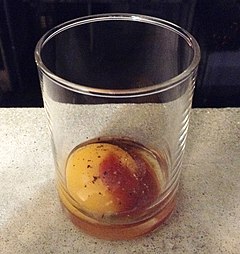Prairie oyster
This article needs additional citations for verification. (December 2016) |

A prairie oyster (sometimes also prairie cocktail) is a traditional beverage consisting of a raw egg (often yolk alone), Worcestershire sauce, vinegar and/or hot sauce, table salt, and ground black pepper. Tomato juice is sometimes added, reminiscent of a Bloody Mary. The egg is broken into a glass so as not to break the yolk. The mixture is quickly swallowed. The unbroken yolk causes the drink to bear a texture similar to that of an oyster. The concoction has been referred to as a traditional cure for hangovers, and has appeared in media for decades.
Supposed hangover remedy properties
Though considered a traditional hangover remedy, the prairie oyster has not been scientifically proven to treat hangover symptoms. Headache experts say that a prairie oyster will not work as a remedy for a hangover.[1]
It has been suggested that the raw egg in a prairie oyster may alleviate the symptoms of a hangover since eggs contain cysteine, an amino acid which helps the body break down acetaldehyde, a by-product of processing alcohol.[2][3] However, there is no reliable evidence showing that consuming foods with this amino acid relieves hangover symptoms.[4] Furthermore, research shows that amino acids in raw eggs are less digestible than amino acids in cooked eggs.[5]
It has also been suggested that a prairie oyster may seem to relieve hangover symptoms by acting as a distraction and a placebo.[6]
In popular culture
- In P. G. Wodehouse's 1916 short story "Jeeves Takes Charge", Jeeves cures Bertie Wooster's hangover with his version of a prairie oyster.[7] The drink is not named in the story but it fits the description of a prairie oyster. As Jeeves says, "It is a little preparation of my own invention. It is the Worcester Sauce that gives it its colour. The raw egg makes it nutritious. The red pepper gives it its bite."[8] Jeeves also serves this hangover cure in other stories. It is very effective, and Bertie suspects that there is more to the drink than the ingredients mentioned by Jeeves.[9]
- In the 1934 George Orwell novel Keep the Aspidistra Flying, Ravelston prepares Gordon a prairie oyster in jail.
- In the 1936 Frank Capra film Mr. Deeds Goes to Town, Longfellow Deeds is offered a prairie oyster after a night on the town.
- The novel Goodbye to Berlin (1939) by Christopher Isherwood mentions prairie oysters several times, where Sally and Chris drink them in Sally's room.
- The Palm Beach Story, the 1942 screwball comedy directed by Preston Sturges, shows Gerry Jeffers ordering a prairie oyster in a train dining car.
- In the 1972 film Cabaret, Sally Bowles regularly makes prairie oysters, remarking that they "work instantly, even on the most sinister hangovers".
- In a 1985 episode of Number 73 (series 5, episode 21), a Saturday morning children’s television show aired in the UK, Neil and Harry each drink a prairie oyster to ward off a hangover resulting purportedly caused by staying out all night drinking fizzy orange juice.
- In the 1993 film Addams Family Values, Gomez Addams makes a Prairie Oyster and shakes it up in a bottle to give to his infant son after a night of celebrating Fester's wedding to Debbie.
- In a 1998 episode of the anime Cowboy Bebop, the protagonist Spike Spiegel orders a prairie oyster to get over a hangover, although he adds Boofeater (a reference to the London Dry Gin Beefeater) to the cocktail.
- In Season 1, episode 14 “The Harriet Dinner, Part II” (2007) of the television show Studio 60 on the Sunset Strip, Jack Rudolph suggests that Kim Tao is given a prairie oyster after drinking too much tequila.
- In the 2010 play Heathers: The Musical by Kevin Murphy and Laurence O'Keefe, one of the titular characters, Heather Chandler, requests a prairie oyster, to alleviate the hungover feeling after the party scene.
- In the 2013 television series Spies of Warsaw episode 3, Lady Angela Hope brings a Prairie Oyster to Jean-Francois Mercier in bed to help with his hangover.
See also
- Amber Moon, a similar drink containing alcohol
References
- ^ Cox, Lauren (December 31, 2009). "Hangover 'Cures': What Helps and What Hurts". ABC News. Retrieved May 26, 2020.
- ^ Stevens, Ashlie (March 7, 2016). "The Prairie Oyster: A Survey of 100 Years in Pop Culture". Eater. Retrieved May 26, 2020.
- ^ "Hangover cure #4: The Prairie Oyster". Now Toronto. November 17, 2012. Retrieved May 26, 2020.
- ^ Greenwood, Veronique (December 31, 2018). "No, you can't eat your way out of a hangover". BBC Future. BBC. Retrieved May 26, 2020.
- ^ Palsdottir, Hrefna (July 23, 2016). "Is Eating Raw Eggs Safe and Healthy?". Healthline. Retrieved May 26, 2020.
- ^ Robson, David (December 15, 2015). "What's the secret to dodging hangovers?". BBC Future. BBC. Retrieved May 26, 2020.
- ^ Cawthorne, Nigel (2013). A Brief Guide to Jeeves and Wooster. London: Constable & Robinson. p. 47. ISBN 978-1-78033-824-8.
- ^ Wodehouse, P. G. (2008) [1925]. "Jeeves Takes Charge". Come On, Jeeves (Reprinted ed.). Arrow Books. p. 13. ISBN 9780099513698.
- ^ Wodehouse, P. G. (2008) [1934]. "Chapter 5". Right Ho, Jeeves (Reprinted ed.). Arrow Books. p. 48. ISBN 9780099513742. Bertie narrates: "I have had occasion, I fancy, to speak before now of these pick-me-ups of Jeeves's [...] What they consist of, I couldn't tell you. He says some kind of sauce, the yolk of a raw egg and a dash of red pepper, but nothing will convince me that the thing doesn't go much deeper than that."
